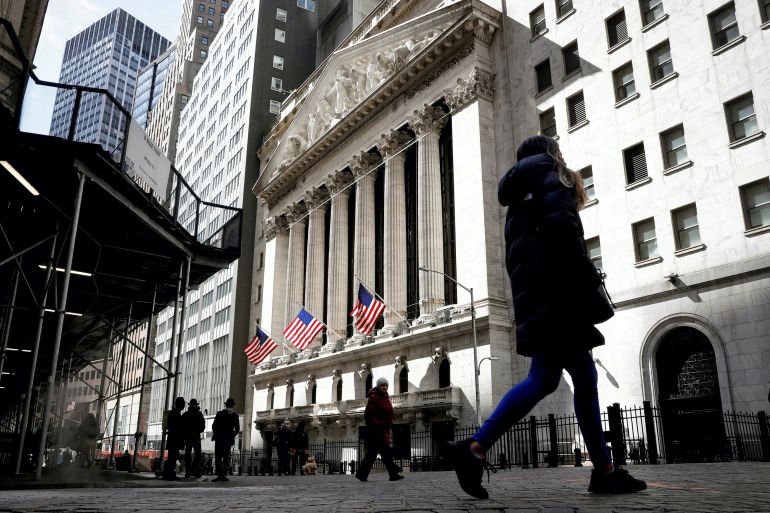Stocks get wobbly start to new month after volatile January
Stocks have been in slump so far this year as investors get hit with a long list of threats to economic growth.

Stocks wobbled in afternoon trading on Wall Street on Tuesday as the market comes off its worst month since early in the coronavirus pandemic nearly two years ago.
The S&P 500 rose 0.1 percent as of 12pm ET (17:00 GMT). The Dow Jones Industrial Average rose 20 points, or 0.1 percent, to 35,156 and the Nasdaq Composite Index rose 0.3 percent.
Keep reading
list of 4 itemsTexas electricity prices spike with cold front set to test grid
Fewer US workers are telling their bosses ‘I quit’
Will oil reach $100 a barrel? And how will it affect you?
Companies that make home goods and personal products fell. Procter & Gamble shed 1.6 percent.
Energy stocks made solid gains, led by a 6.1 percent rise from ExxonMobil after the company reported a surprisingly good profit in its fourth quarter as demand for oil continues to improve.
Banks also gained ground as bond yields rose. The yield on the 10-year Treasury, which is used to set rates on home mortgages and many other kinds of loans, rose to 1.81 percent from 1.77 percent late Monday. Bank of America rose 1.1 percent.
Technology stocks were mixed, which helped mute trading in the rest of the market. The sector has been particularly sensitive to concerns about rising interest rates this year. Higher interest rates tend to make pricey growth stocks, like big tech companies, less attractive for investors.
Stocks have been in a slump so far this year as investors get hit with a long list of threats to economic growth and the markets.
The economic recovery is being threatened by persistently rising inflation that has raised costs for businesses and consumers. The big fear is that higher prices being passed off to consumers will eventually curtail spending and crimp economic growth.
The United States Federal Reserve is shifting monetary policy and plans on raising interest rates to fight rising inflation, which will affect investments and stock prices. Ultra-low rates and other stimulus helped markets recover from the initial shock of the pandemic, and then supported stunning gains. Investors expect the Fed to start raising interest rates in March, but there is much uncertainty about how sharply and how quickly the Fed will move throughout the year.
The pandemic is still a lingering threat, and each new coronavirus variant could bring a surge of cases that threatens businesses and consumer activity.
Investors are reviewing the latest round of earnings, in part to see how inflation, the pandemic and other factors are impacting businesses and their operations moving forward.
UPS surged 14.7 percent after the package-delivery service reported far better results than analysts were expecting. Rival FedEx rose 2.9 percent.
Several big companies are on deck for earnings. Google’s parent, Alphabet, will report financial results along with General Motors and Starbucks after the market closes Tuesday.
Facebook’s parent, Meta Platforms, will report results on Wednesday, while Amazon and Ford will report their results on Thursday.
Investors are also looking forward to the US Department of Labor’s employment report for January, which will be released on Friday.